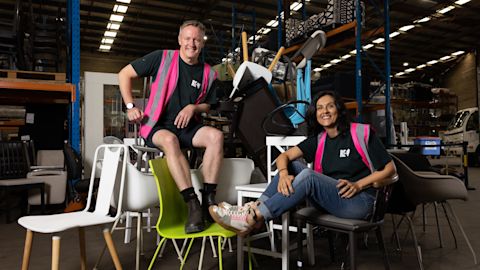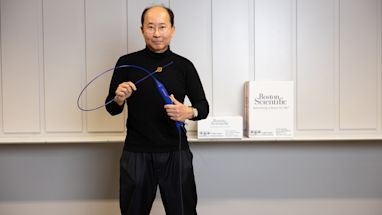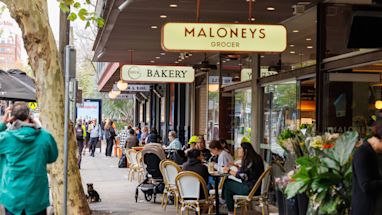City of Sydney grant recipient ReLove is working to support vulnerable people in crisis with a smart and sustainable solution.
If you’re escaping domestic violence or homelessness, being given the keys to a new home isn’t always a happy and fresh start. ReLove co-founder Ren Fernando said it’s too common for people leaving crisis care to have no resources to furnish their home.
“We have women and children sleeping on floors every single night in Sydney – it’s just non-stop. There’s no way someone can restart their life when they have nothing but a roof over their head.”
ReLove helps people starting their new lives with the dignity and stability of a furnished home.
“We rescue stuff from going to landfill and support the most vulnerable people in our society. It’s a bit of a no-brainer,” Fernando said.

An accidental charity
Fernando and her ReLove co-founder and friend Ben Stammer began the charity in 2020 during “the big Covid clean-out”. They were stunned by the quantity and quality of goods being dumped on the street.
They hired a van, began pulling furniture off the road and diverted it to people in need.
“We borrowed a little warehouse space and said we'd just rehome 5 families,” Fernando said.
Since 2020, the organisation has furnished homes for more than 1,600 families.
Many of these are women and children impacted by domestic and family violence. They also support young people at risk, people seeking asylum and those leaving prison.

ReLove works on a referral basis with caseworkers from more than 45 grassroots charities including the Wayside Chapel, the Women’s and Girls’ Emergency Centre and Weave Youth. Most of the people the charity supports are in the City of Sydney's local area and 40% are Aboriginal and/or Torres Strait Islander people.
While ReLove accepts donations from the public, to get furniture at scale they tap into a huge source of furniture waste: commercial strip outs, or ‘defits’.
A smart solution to a big problem
Each year Australia generates 30,000 tonnes of commercial furniture waste, with 95% of this ending up in landfill, according to the federal government.
The hotel industry is a major source of ReLove donations.
“It’s not that hotels don’t want to do the right thing, there has just been no solution for them. It’s a huge logistical exercise,” Fernando said.
Recently, ReLove sourced more than 200 beds from a serviced apartment chain upgrading its furnishings in Bondi. Serviced apartments have also donated fridges, washing machines and dryers.
Key to their work is educating construction companies and developers on the importance of planning well in advance to send furniture from their commercial defits to ReLove. Construction and development group Built is a key partner and has begun building this process into its tenders with clients.
“Commercial-grade furniture has a long life – it’s designed to survive a lot of use. Meeting room table set-ups are perfect for apartments and then there’s all the chairs and sofas,” Fernando said.
In the 2022/23 financial year alone, ReLove saved more than 1,100 tonnes of furniture from landfill and provided more than $9.2 million of material aid free to people they support.
It's a great example of the circular economy in action.

The shopping trip of a lifetime
The warehouse is cavernous. But tucked at the entrance you’ll find a homewares store like no other.
The ReLove Free Store is a safe place for people in crisis to shop for everything they need to furnish their new home. Shoppers aren’t expected to share their story with volunteers and they’re given privacy and space to choose what they need.
“We try to work with charities in a really fast and responsive way so there is no retelling of trauma for these people.
“They don’t need to jump through hoops to get to us. Once they have been assessed by their caseworker, that’s all we need to know,” Fernando said.

The store is stacked with shelves of bedding, homewares, decorative objects, small electricals, cutlery – everything down to the potato peeler that you’d need to make a house a home. The bigger items of furniture and whitegoods are in the adjoining warehouse.
“It’s amazing how little people ask for. It’s overwhelming. Often they’ve never had the opportunity to have choice like this and it’s really daunting,” Fernando said.
On average, ReLove provides around $10,000 to $15,000 in furniture and household items free to each family. There are gaps in what they can access. Grants like the one it received from the City of Sydney and donations of new goods from big corporate companies help them fill those gaps.
How you can help
Donate your good quality furniture to ReLove
ReLove is currently looking for great quality bedside tables, coffee tables, chests of drawers, sofas (no sofa beds) and beds (mattresses must be completely free of marks or stains).
You’ll need to share photos of the items, including size and condition and deliver it yourself to the Botany warehouse. Find out more.
Volunteer
ReLove is always looking for volunteers to help. Volunteers drive delivery vans, help in the warehouse and participate in fundraising projects. Visit relove.org.au to learn more.
Plan defits
Developers, architects and builders should plan what they’re going to do with defit furniture and goods and contact ReLove.
If you are an organisation with a larger donation (for example, office relocation, hotel refurbishment) you can email ReLove at donations@relove.org.au.
ReLove received a City of Sydney innovation grant. Find out more about our grants and sponsorships.
If you or someone you know needs support call 1800 RESPECT (1800 737 732) or visit 1800respect.org.au
Published 25 January 2024, updated 18 December 2024



